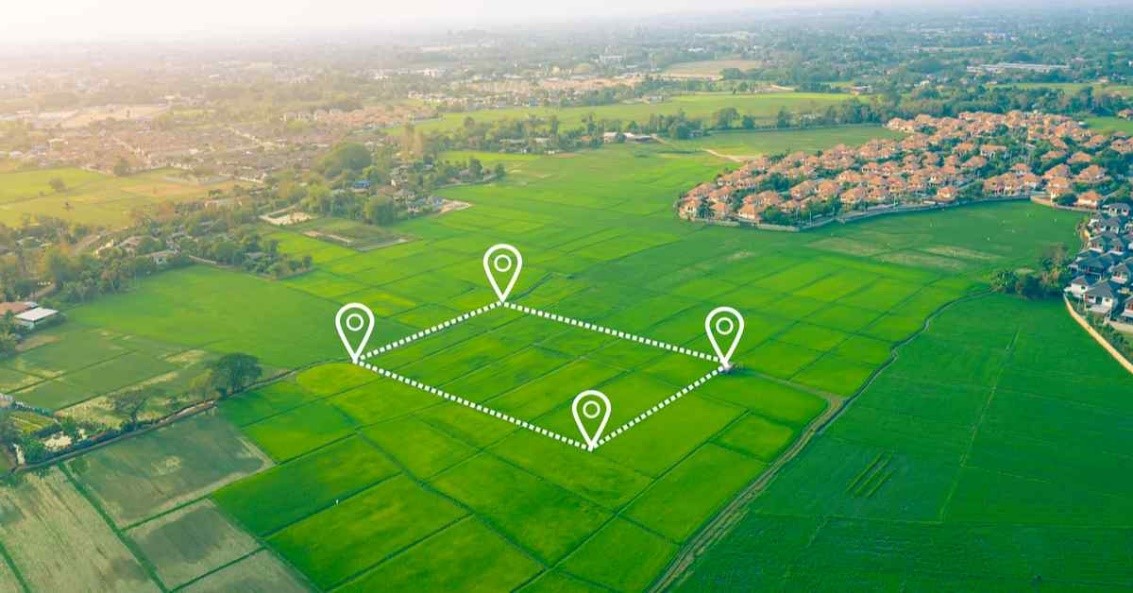Constructing a house is a significant decision, often filled with dreams of living close to nature, especially for those seeking peace in the outskirts of cities like Mumbai, Pune, and Nashik. Agricultural lands, with their serene surroundings and lower cost, naturally draw attention. However, building a residential structure on agricultural land in Maharashtra without following due process can lead to severe legal and financial consequences. This blog explores the rules, penalties, and solutions related to house construction in agricultural land, specifically in the context of Maharashtra.
Also Read:- Pre-EMI vs Full EMI: Get the Right Financing for Your Dream Home
What Are the Agricultural Land Rules in Maharashtra?

Agricultural land in Maharashtra is governed by the Maharashtra Land Revenue Code, 1966, which categorically restricts the use of such lands for non-agricultural purposes unless proper conversion is undertaken. The law considers land ownership, intended use, and zoning classifications as core parameters.
These rules are strictly enforced by the revenue and town planning departments to prevent indiscriminate construction, illegal developments, and misuse of fertile land.
Also Read:- Property Tax Pune Municipal Corporation: Online | Receipt | News
Key agricultural land rules in Maharashtra include:
- Only agriculturists can purchase agricultural land.
- Non-agricultural (NA) conversion is mandatory before any house construction in agricultural land.
- Construction must align with development control regulations and zoning laws of local authorities.
- Unauthorized construction may attract penalties, demolition, and even criminal proceedings.
Can We Build a Farm House on Agricultural Land in Maharashtra?
The simple answer is yes—but with restrictions and permissions. While the term farmhouse often evokes images of cozy homes surrounded by greenery, the law doesn’t allow free rein to build as one pleases.
Here are the conditions under which you can build a farmhouse:
- You must be the owner of the land and an agriculturist (as per revenue records).
- Construction must be for ancillary use to agriculture, like a rest house, storehouse, cattle shed, or modest farmhouse.
- The area covered by construction must not exceed a certain percentage, often 10% of the total land area or as specified by the local development plan.
- Permission from the Collector’s office or Tehsildar is mandatory.
- Water and electricity connections are granted only after proving lawful construction.
Failure to comply leads to the status of unauthorized construction, triggering fines and other repercussions.
What Is the Penalty for Building a House on Agricultural Land Without Conversion?

If you construct a house on agricultural land without converting it to non-agricultural (NA) use, you invite serious legal and financial consequences. Authorities in Maharashtra view unauthorized construction as a violation of land-use policy, subject to both civil and criminal liabilities.
Here are the major penalties:
- Penalty Fine: Ranges from ₹10,000 to several lakhs depending on the land size, location, and violation severity.
- Demolition Notice: The local authority can issue a notice and order demolition of the unauthorized structure.
- Regularization Charges: If the structure can be regularized, you’ll be charged a premium and development fees, often 2x to 5x the normal charges.
- Criminal Action: In case of deliberate violation, FIRs can be filed leading to potential prosecution.
- Disqualification from loans and utilities: Illegal constructions don’t get loan approvals, electricity or water supply.
In some cases, the landowner may be banned from transacting or developing the land until legal issues are resolved.
How to Avoid the Penalty: What Is the Process of Land Conversion?

The cost of converting agricultural land to NA in Maharashtra depends on several factors such as location, size, and zoning. However, going through this process is the only legal way to construct a house on agricultural land without penalties.
Here’s the standard NA conversion process:
- Application to the Collector’s Office in the respective district.
- Submission of documents:
- 7/12 Extract
- Title deed
- Land survey plan
- No objection certificate (NOC) from local authorities
- Scrutiny and site visit by revenue officials.
- Payment of conversion fees, premium, and development charges.
- Receipt of NA permission after approval.
NA permission usually comes under categories such as residential, commercial, industrial, etc. The fees vary by location—urban areas can cost more due to higher land value.
Also Read:- Maharashtra May Soon Extend Slum Rehab Benefits to First-Floor Chawl Residents: What It Means for You
What Is the Cost of Converting Agricultural Land to NA in Maharashtra?

The cost of converting agricultural land to non-agricultural land depends on:
- Location of the land: Closer to city limits, higher the charges.
- Land area: Higher area means more conversion charges.
- Land use type post-conversion: Residential, commercial, or industrial uses attract different fees.
- Zoning category under the local development plan.
On average, the cost may range from ₹100 to ₹500 per square meter, excluding premiums, application charges, and taxes.
Additionally, the owner must pay betterment charges, development cess, and sometimes a land use change premium. Skipping this process results in your construction being labeled illegal.
Is House Construction in Agricultural Land Ever Allowed Without NA?
Rarely, and only under special conditions:
- The landowner must be a registered farmer or agriculturist.
- Construction should be for farming support activities only.
- Even then, permission from the local panchayat or municipal body is required.
- No luxury homes or multi-story buildings are allowed without NA conversion.
If the house does not comply with these requirements, it will attract the penalty for building house on agricultural land in Maharashtra.
Also Read:- How Can You Get a Stamp Duty Refund Online in Maharashtra?
What Should You Do If You’ve Already Built on Agricultural Land?
If you’ve already constructed a house on agricultural land, it’s crucial to act before enforcement authorities do.
Immediate steps you should take:
- Consult a lawyer or real estate expert for land status verification.
- Apply for NA conversion (retrospective) and regularization.
- Pay required penalties, premium charges, and submit documentation.
- Get building plan approvals post-regularization.
- Avoid further construction or sale till the issue is resolved.
Delaying action can increase financial liabilities and jeopardize your ownership rights.
Why Should You Be Cautious Before Buying Agricultural Land for Construction?

Many buyers are lured by cheaper agricultural plots promising farmhouses or second homes. However, ignorance of agricultural land rules in Maharashtra can cost you a fortune later.
Before investing:
- Check land title and whether the owner is an agriculturist.
- Verify zoning, development control regulations, and allowed usage.
- Demand NA status documentation if the property is marketed as ready for construction.
- Beware of brokers or developers promising construction without NA conversion.
Remember, constructing a house legally on agricultural land is possible—but only with the right permissions and process.
Also Read:- Godrej Properties Expands Aggressively with New Acquisitions in North Bengaluru and Raipur
Conclusion
Building a house on agricultural land in Maharashtra may sound idyllic, but skipping the non-agricultural land conversion process can lead to serious repercussions. From hefty fines to demolition, the penalties are steep, especially if done without due diligence. Whether you’re building a farmhouse or planning a permanent residence, understanding the agricultural land rules in Maharashtra is vital.
At Housiey Blogs, we aim to simplify the complex world of real estate for homebuyers. If you’re considering investing in land or building a home, ensure you’ve followed every legal guideline to safeguard your investment.
Also, don’t forget to check out our detailed blog on “Farm House Construction Rules in Maharashtra” to understand the right way to build your dream home in green zones.
FAQs
Constructing a house is a significant decision, often filled with dreams of living close to nature, especially for those seeking peace in the outskirts of cities like Mumbai, Pune, and Nashik. Agricultural lands, with their serene surroundings and lower cost, naturally draw attention. However, building a residential structure on agricultural land in Maharashtra without following due process can lead to severe legal and financial consequences. This blog explores the rules, penalties, and solutions related to house construction in agricultural land, specifically in the context of Maharashtra.
Also Read:- Pre-EMI vs Full EMI: Get the Right Financing for Your Dream Home
What Are the Agricultural Land Rules in Maharashtra?

Agricultural land in Maharashtra is governed by the Maharashtra Land Revenue Code, 1966, which categorically restricts the use of such lands for non-agricultural purposes unless proper conversion is undertaken. The law considers land ownership, intended use, and zoning classifications as core parameters.
These rules are strictly enforced by the revenue and town planning departments to prevent indiscriminate construction, illegal developments, and misuse of fertile land.
Also Read:- Property Tax Pune Municipal Corporation: Online | Receipt | News
Key agricultural land rules in Maharashtra include:
- Only agriculturists can purchase agricultural land.
- Non-agricultural (NA) conversion is mandatory before any house construction in agricultural land.
- Construction must align with development control regulations and zoning laws of local authorities.
- Unauthorized construction may attract penalties, demolition, and even criminal proceedings.
Can We Build a Farm House on Agricultural Land in Maharashtra?
The simple answer is yes—but with restrictions and permissions. While the term farmhouse often evokes images of cozy homes surrounded by greenery, the law doesn’t allow free rein to build as one pleases.
Here are the conditions under which you can build a farmhouse:
- You must be the owner of the land and an agriculturist (as per revenue records).
- Construction must be for ancillary use to agriculture, like a rest house, storehouse, cattle shed, or modest farmhouse.
- The area covered by construction must not exceed a certain percentage, often 10% of the total land area or as specified by the local development plan.
- Permission from the Collector’s office or Tehsildar is mandatory.
- Water and electricity connections are granted only after proving lawful construction.
Failure to comply leads to the status of unauthorized construction, triggering fines and other repercussions.
What Is the Penalty for Building a House on Agricultural Land Without Conversion?

If you construct a house on agricultural land without converting it to non-agricultural (NA) use, you invite serious legal and financial consequences. Authorities in Maharashtra view unauthorized construction as a violation of land-use policy, subject to both civil and criminal liabilities.
Here are the major penalties:
- Penalty Fine: Ranges from ₹10,000 to several lakhs depending on the land size, location, and violation severity.
- Demolition Notice: The local authority can issue a notice and order demolition of the unauthorized structure.
- Regularization Charges: If the structure can be regularized, you’ll be charged a premium and development fees, often 2x to 5x the normal charges.
- Criminal Action: In case of deliberate violation, FIRs can be filed leading to potential prosecution.
- Disqualification from loans and utilities: Illegal constructions don’t get loan approvals, electricity or water supply.
In some cases, the landowner may be banned from transacting or developing the land until legal issues are resolved.
How to Avoid the Penalty: What Is the Process of Land Conversion?

The cost of converting agricultural land to NA in Maharashtra depends on several factors such as location, size, and zoning. However, going through this process is the only legal way to construct a house on agricultural land without penalties.
Here’s the standard NA conversion process:
- Application to the Collector’s Office in the respective district.
- Submission of documents:
- 7/12 Extract
- Title deed
- Land survey plan
- No objection certificate (NOC) from local authorities
- Scrutiny and site visit by revenue officials.
- Payment of conversion fees, premium, and development charges.
- Receipt of NA permission after approval.
NA permission usually comes under categories such as residential, commercial, industrial, etc. The fees vary by location—urban areas can cost more due to higher land value.
Also Read:- Maharashtra May Soon Extend Slum Rehab Benefits to First-Floor Chawl Residents: What It Means for You
What Is the Cost of Converting Agricultural Land to NA in Maharashtra?

The cost of converting agricultural land to non-agricultural land depends on:
- Location of the land: Closer to city limits, higher the charges.
- Land area: Higher area means more conversion charges.
- Land use type post-conversion: Residential, commercial, or industrial uses attract different fees.
- Zoning category under the local development plan.
On average, the cost may range from ₹100 to ₹500 per square meter, excluding premiums, application charges, and taxes.
Additionally, the owner must pay betterment charges, development cess, and sometimes a land use change premium. Skipping this process results in your construction being labeled illegal.
Is House Construction in Agricultural Land Ever Allowed Without NA?
Rarely, and only under special conditions:
- The landowner must be a registered farmer or agriculturist.
- Construction should be for farming support activities only.
- Even then, permission from the local panchayat or municipal body is required.
- No luxury homes or multi-story buildings are allowed without NA conversion.
If the house does not comply with these requirements, it will attract the penalty for building house on agricultural land in Maharashtra.
Also Read:- How Can You Get a Stamp Duty Refund Online in Maharashtra?
What Should You Do If You’ve Already Built on Agricultural Land?
If you’ve already constructed a house on agricultural land, it’s crucial to act before enforcement authorities do.
Immediate steps you should take:
- Consult a lawyer or real estate expert for land status verification.
- Apply for NA conversion (retrospective) and regularization.
- Pay required penalties, premium charges, and submit documentation.
- Get building plan approvals post-regularization.
- Avoid further construction or sale till the issue is resolved.
Delaying action can increase financial liabilities and jeopardize your ownership rights.
Why Should You Be Cautious Before Buying Agricultural Land for Construction?

Many buyers are lured by cheaper agricultural plots promising farmhouses or second homes. However, ignorance of agricultural land rules in Maharashtra can cost you a fortune later.
Before investing:
- Check land title and whether the owner is an agriculturist.
- Verify zoning, development control regulations, and allowed usage.
- Demand NA status documentation if the property is marketed as ready for construction.
- Beware of brokers or developers promising construction without NA conversion.
Remember, constructing a house legally on agricultural land is possible—but only with the right permissions and process.
Also Read:- Godrej Properties Expands Aggressively with New Acquisitions in North Bengaluru and Raipur
Conclusion
Building a house on agricultural land in Maharashtra may sound idyllic, but skipping the non-agricultural land conversion process can lead to serious repercussions. From hefty fines to demolition, the penalties are steep, especially if done without due diligence. Whether you’re building a farmhouse or planning a permanent residence, understanding the agricultural land rules in Maharashtra is vital.
At Housiey Blogs, we aim to simplify the complex world of real estate for homebuyers. If you’re considering investing in land or building a home, ensure you’ve followed every legal guideline to safeguard your investment.
Also, don’t forget to check out our detailed blog on “Farm House Construction Rules in Maharashtra” to understand the right way to build your dream home in green zones.
FAQs












